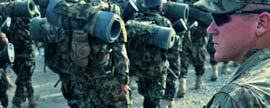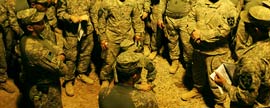If you are struggling with PTSD, the VA can help.
I used to have a reoccurring dream after I returned home from my last deployment. It always began and ended the same.
I am running down an alley towards my truck. I am at a full out sprint with bullets skipping the dirt around my heels. I feel as though I cannot run fast enough but finally make it to my vehicle. I jump in, look at the floor board then glance down the alley from which I came. I scream to my driver to move out. No response. I look over to the driver, noticing that my gunner’s legs are not in the gunner’s position, and see that my driver has been replaced with an Insurgent. I pull my 9mm pistol out of my leg holster and point it at his head. He smiles and places the truck in gear to start moving. I pull the trigger of my pistol and put a round in his head. Blood and grey matter covers the inside of the truck. The truck slowly lurches to a stop against a wall. I get out of the truck, I am surrounded, they open fire, and I wake up.
The reason I wanted to share this is because it helped me. Talking about the dream, the events of my prior deployment, and everything I went through in Ar Ramdi with my family, friends, therapist, and Soldiers helped me cope. When I was coming up in the Army as a young Private it was looked down upon if you wanted to get help for anything; it was considered a sign of weakness. Times have changed, but we still (although not nearly as bad) have this stigma in the military, primarily in the Senior Noncommissioned Officer Corp, that anyone who wants to get help is weak. I want to help change that. I regularly talk to my Soldiers as if getting help is no big deal, that it is as normal as spraining your ankle. The more they hear about me talking openly about getting help, the better. Soldiers need to know that they can depend on their leadership to support them getting better. It’s our job.
The Department of Defense recently released Suicide numbers that were greater than the number we lost due to combat. In the Army we are all brothers, and to lose a brother to suicide is unacceptable. Yes, we receive numerous hours of training learning to identify indicators of suicide and what to do, but somewhere we are failing. Many people have their own perception of what needs to be done and how to combat the issue, but it’s only getting worse. Is it disenfranchised leadership? If so, what level? Team Leader, Squad Leader, Platoon Sergeant, or is it the First Sergeant’s fault? I believe it’s everyone’s fault 90% of the time.
What do I think? What it boils down to is leaders need to care. Leaders need to put their Soldiers’ needs above their own. Care about what they do. Care about them and their personal lives. Know everything there is to know about that Soldier, so when one little thing is off, leadership can spot it quick and react. When deployed, we eat, sleep, and go on missions with each other every day. We spend 9 to 15 months serving with that Soldier, but when we return home, that Soldier who had constant supervision is now left out to dry for a majority of the day. From 0630-1700 he is with his platoon, but not as close as he once was. Many of those Soldiers he deployed with have moved to new duty stations, new Platoons, or have gotten out of the Army. He has lost that support network and brotherhood that he had during that deployment. Soldiers need to know that they can get help, without repercussions, and get it as easily as they can get help for a routine headache. The resources are there, we just need to tighten the screws on leaders. If they don’t genuinely care about their Soldiers and only are looking out for their own best interests, it may be time to swap them out with someone who does.
We have been at war for over 10 years. “Suck it up and drive on” no longer works… We can beat this suicide trend. All we need to do is care.















Comments
SGT NICK
What? Suicide is the nature of life in any career, for some reason or another its widely publicize in the military. I strongly believe its because the background of the armed forces. Army Soldiers lives are not the same as, you say, bank of america headquarters corporate workers. The suicide rate in the Army is ALWAYS blamed on junior leaders which I find unfair and an easy cop out when higher HQ doesnt have answers to high suicide rates.
I always tell Soldiers to find help when they need it. Single soldiers that have a hard time fitting in? I hand them upcoming events to BOSS programs. Married Soldiers going through troubles? I recommend they see the Chaplain or to participate in the next strong bonds retreat.
What I wont do is listen to Soldier’s complaints when suddenly they have to go to training, WLC, or the field and I tell them to Soldier up and get through the training. Suddenly their is always one hero that will run in and blame me for not caring about the Soldier or their issues.
All the way 1SG, GO CAV!!!
*All views expressed in this article are those of the author and do not necessarily represent the views of, and should not be attributed to, The Department of Defense or the US Army.*
James
SGT Nick!
First off, thank you for the reply and thoughts on this subject, they are appreciated. You are correct that suicide is a problem no matter the job. The problem is that suicide is gaining traction in the Army, and THAT is leader business – our business.
It sounds like you have a plan and are genuinely concerned about your Soldiers, and again, is our job as leaders.
As a 1SG I can relate to your concern with Soldiers coming up with excuses or problems prior to a field problem or deployment.
Here is a tip – Do your best to identify those Soldiers prior to the deployment and help solve the possible “problems” before they pop up.
Keep up the good work!
1SG Gibson
Part-Time-Commander
Great post, James. I agree with you that it’s okay to get help when we need it. One of the worst things to do is try and deal with everything on your own, especially if you are overwhelmed or depressed. Working with a licensed psychologist, therapist or Chaplain can work wonders. Smart leaders get help when they need it. And they know when their subordinates need help!
Great post, Top! Thanks for sharing.
Chuck
James
Thanks for the reply and kind words!